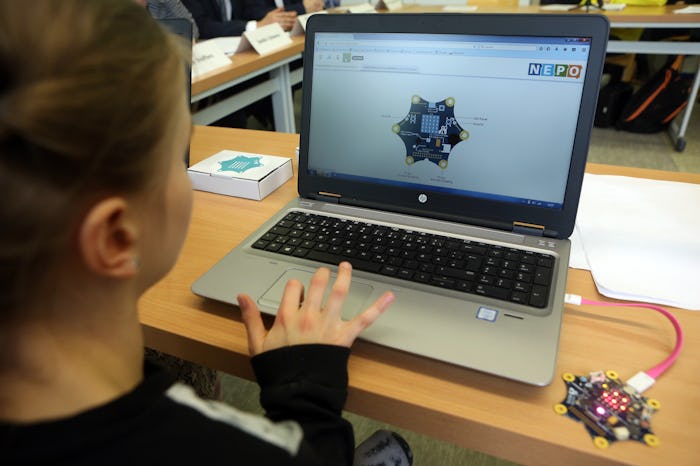Life

Here's What You Need To Know About Generation Z
Kids are often an enigma to their parents, who work to figure out how they learn; which celebrities are their favorites and why; how they relate to their friends, technology, and the world; and much, much more. A lot of that has to do with understanding individual personalities — and a lot of the mystery is the result of generational differences. Parents, of course, want to know their kids on a deep, one-on-one level, and spend time talking to and listening to them to do that. Marketers and advertisers, on the other hand, want to understand the generation as an aggregate to develop strategies to best reach them. Luckily, studies about our kids' generation can help everyone start to crack the code that is Generation Z.
When older generations try to really get younger ones, finger-pointing, blaming, and berating ensues. Millennials, for example, have taken the fall for killing off entire industries with their incomprehensible spending habits. Elected officials buy into the stereotype that they are entitled and lazy. They're subjected to perplexing, condescending advice about avocado toast and securing a mortgage. So we should do better for Generation Z, those kids, tweens, and teens born between (roughly) 1996 and 2010. We should unpack studies about them with empathy and an open mind, set aside preconceived notions, and accept that these kids will change the world. Most importantly, we should acknowledge the fact that that's not such a bad thing after all.
The following roundup of studies and data is by no means comprehensive, but it does begin to tell the story of these multifaceted, multitalented Gen Zers.
Screen Time Is All The Time
Today's teenagers spend a lot of time in front of screens. In 2015, a study from the nonprofit group Common Sense Media found that a whopping nine hours of the average teenager's day are devoted to consuming media on their phones, computers, or tablets, according to The Washington Post. For kids aged 8 to 12, the figure was nearly six hours. That's striking because such nearly nonstop exposure to these devices can literally alter a person's brain functioning, according to Business Insider. For example, an addiction to computers or smartphones can make it harder for kids to concentrate and build their vocabularies.
They Might Not Have An Attention Problem, Per Se
Potentially abbreviated attention spans for Generation Z is a dire diagnosis, but it might not be the entire story. Innovation consultant Jeremy Finch and his team recently worked with 12 16- to 18-year-olds to get a nuanced understanding of their lives "through a series of in-depth discussions, video diaries, and daily interactive exercises," he wrote for Fast Company. Over the course of that research, he concluded that they're not necessarily terrible at paying attention. Instead, he argued, these teenagers have developed "highly evolved 'eight-second filters'" that help them quickly and efficiently identify the relevant information among the endless content to which they have access online.
From there, they can display an impressive focus, Finch wrote:
Once something has demonstrated attention-worthiness, Gen Z can become intensely committed and focused. They've come of age with an Internet that's allowed them to go deep on any topic of their choosing and learn from like-minded fans.
They Face Real Mental Health Issues
According to The Guardian, members of Gen Z seek help for issues related to self-esteem, anxiety, depression, and self-harm at a higher rate than any other generation. It's true that this may be due in part to society's better understanding of these issues now than previously, but it's still striking that the National Society for the Prevention of Cruelty to Children's (NSPCC) Chlidline fielded more calls related to mental health and depressive disorders than in 2015 and 2016 than another else. In 1986, this didn't even rank in the top 10.
Remember, Gen Zers are the most connected generation ever, its members were practically born with smartphones in hand. NSPCC head of participation Emily Cherry suspects that this has something to do with the mental health issues they experience, as she told The Guardian:
Every time they switch on their phones they're getting messages about parties they haven't been invited to, or they're seeing photos of their friends doing things, or their whole self-worth is based on how many likes they're getting on Facebook. It absolutely permeates their sense of self-worth.
They Don't Learn The Same Way Their Parents Did
To mark the arrival of the older Gen Zers to college, Barnes and Noble College released the results of a study of their learning styles and preferences this month. And it turns out that they don't want to do college they way their parents did. Instead of simply showing up to lectures and taking notes, Generation Z wants class discussions, engaging learning environments, and unbridled access to digital learning tools, according to Forbes. Additionally, Gen Z tends to be more career-focused than their older Millennial brothers and sisters.
They're Queer & Proud Of It
Millennials largely adhere to gender and sexuality binaries. Gen Z is totally subverting it. Those were some of the major findings of a study the trend forecasting agency J. Walter Thompson Innovation Group conducted recently. Encompassing 1,000 respondents, the study founds that more than one-third of Gen Zers identify as "bisexual to some degree," according to Vice, while 24 percent of Millennials do. Forty-three percent of the Gen Zers reported that they knew someone who prefers gender neutral pronouns such as "they," "them," or "ze"; The same was true for just 23 percent of Millennials older than 28.
Clearly, Generation Z is already shaking things up — and they're just getting started.